Samia Usman Fatah (born 28 July 1940) [1] is a former politician from Pakistan. In 1973, she became the first woman to be elected to the country's Upper House, the Senate.
Samia Usman Fatah (born 28 July 1940) [1] is a former politician from Pakistan. In 1973, she became the first woman to be elected to the country's Upper House, the Senate.
Fatah comes from Gujrat and was born into a middle-class family. [2] She completed her schooling in English-medium schools. Her late husband was Sheikh Usman Fateh.
Fatah and her husband were both founding members of the Pakistan People's Party (PPP). [2] Her husband, however left the party in 1972. [2] In 1968, she was appointed President of PPP's Women's Wing for the District of Gujrat. [2]
A PPP candidate, Fatah was elected on a general seat in 1973. This made her the country's first woman senator [3] and the only one during her tenure. [2] [4] Taking the oath on 6 August 1973, she served one term between August 1973 and August 1975. [5] During her tenure, she served on the Committee on Finance, Planning and Development of the Economic Affairs and Statistical Division. [6]
Again on the PPP ticket, Fatah was elected to the National Assembly of Pakistan on a special seat in 1977. [1]
In February 1975, Fatah was part of Prime Minister, Zulfikhar Ali Bhutto's entourage on his official visit to the USA. [2] [7]
She organised protests and demonstrated against the military dictatorship of Zia-ul-Haq in 1977. [1]
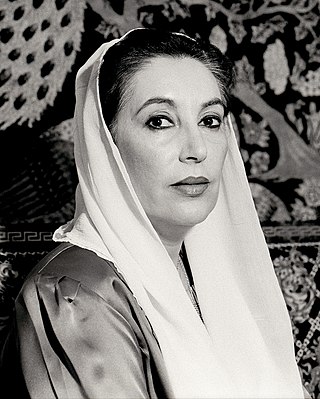
Benazir Bhutto was a Pakistani politician and stateswoman who served as the 11th and 13th prime minister of Pakistan from 1988 to 1990 and again from 1993 to 1996. She was the first woman elected to head a democratic government in a Muslim-majority country. Ideologically a liberal and a secularist, she chaired or co-chaired the Pakistan People's Party (PPP) from the early 1980s until her assassination in 2007.

Mian Muhammad Nawaz Sharif is a Pakistani businessman and politician who served as the Prime Minister of Pakistan for three non-consecutive terms. He is the longest-serving prime minister of Pakistan, having served a total of more than 9 years across three tenures. Each term has ended in his ousting.
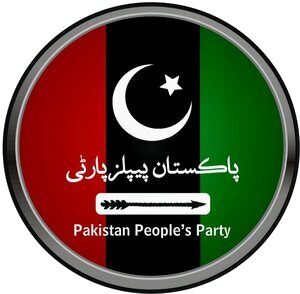
The Pakistan People's Party is a centre-left political party in Pakistan, currently being the largest in the Senate and second-largest party in the National Assembly. The party was founded in 1967 in Lahore, when a number of prominent left-wing politicians in the country joined hands against the rule of Ayub Khan, under the leadership of Zulfikar Ali Bhutto. It is affiliated with the Socialist International. The PPP's platform was formerly socialist, and its stated priorities continue to include transforming Pakistan into a social-democratic state, promoting egalitarian values, establishing social justice, and maintaining a strong military. It, alongside the Pakistan Muslim League-Nawaz and the Pakistan Tehreek-e-Insaf, is one of the three largest political parties of Pakistan.

The Pakistan Muslim League (N) (PML(N) or PML-N; Urdu: پاکستان مسلم لیگ (ن)) is a centre-right, conservative liberal political party in Pakistan. It is currently the third-largest party in the Senate and the largest in the National Assembly. The party was founded in 1993, when a number of prominent conservative politicians in the country joined hands after the dissolution of Islamic Democratic Alliance, under the leadership of former Prime Minister Nawaz Sharif. The party's platform is generally conservative, which involves supporting free markets, deregulation, lower taxes and private ownership. Although the party historically supported social conservatism, in recent years, the party's political ideology and platform has become more liberal on social and cultural issues; however, members have been accused of using Islamist populist rhetoric. Alongside the Pakistan Tehreek-e-Insaf (PTI) and Pakistan People's Party (PPP), it is one of the three major political parties of the country.
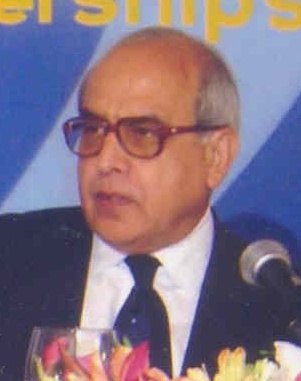
Farooq Ahmad Khan Leghari, was a Pakistani politician who served as the eighth president of Pakistan from 14 November 1993 until resigning on 2 December 1997. He was the first Baloch to be elected as President.

Ghulam Mustafa Jatoi was a Pakistani politician who served as the Caretaker Prime Minister of Pakistan for three months, from 6 August 1990 to 6 November 1990.
Farhatullah Babar is a Pakistani leftist politician, engineer and former senator. He is a prominent member of the Pakistan Peoples Party (PPP), having served as a spokesperson for the party. He is a supporter of the Pashtun Tahafuz Movement (PTM).
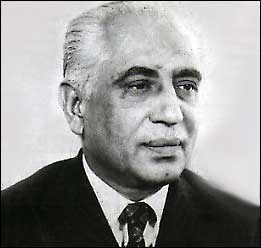
Malik Meraj Khalid, was a Pakistani advocate, left wing politician and Marxist philosopher who served as the Caretaker prime minister of Pakistan from November 1996 until February 1997. He was noted as being one of the original philosophers and founders of the Pakistan Peoples Party (PPP).

Abdul Rehman Malik NI was a Pakistani politician and a Federal Investigation Agency officer, having served as the Interior Minister from being appointed on 25 March 2008 until 16 March 2013.

General elections were held in Pakistan on 3 February 1997 to elect the members of National Assembly. The elections were a fierce contest between Pakistan Peoples Party (PPP) led by pre-election Prime Minister Benazir Bhutto and the Pakistan Muslim League (N) led by Nawaz Sharif. Unlike the 1990 elections where Sharif won due to allegations of rigging, this time he benefited from the controversial death of Bhutto's brother Murtaza, a populist leader, a worsening economy, and alleged corruption cases against Bhutto's husband Asif Ali Zardari.

General elections were held in Pakistan on 6 October 1993 to elect the members of National Assembly. The elections took place after both the Prime Minister Nawaz Sharif and President Ghulam Ishaq Khan resigned to resolve a power struggle.

Fakhar Zaman was the chairman of the Pakistan Academy of Letters from 11 May 2008 to 12 March 2012, when Abdul Hameed replaced him as the next appointed chairman of the body. A leader of the Pakistan Peoples Party (PPP) and the chairman of the World Punjabi Congress, he has also been playing a notable role in politics to achieve his sociopolitical ideals.
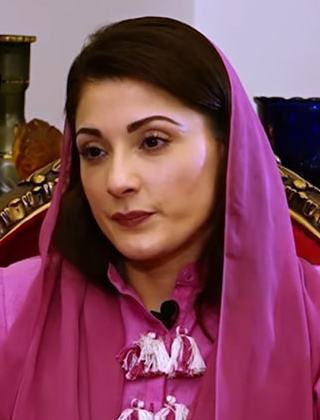
Maryam Nawaz Sharif is a Pakistani politician, currently serving as the 20th Chief Minister of Punjab, in office since 26 February 2024. She is the daughter of former Prime Minister of Pakistan Nawaz Sharif and her initial involvement in public life was through her family’s philanthropic organisations. However, her political career began in earnest in 2012 when she took charge of the election campaign for the 2013 general elections. Following the elections, she was appointed as the Chairperson of the Prime Minister’s Youth Programme in 2013. Despite her active role, she resigned from the position in 2014 after her appointment was legally challenged in the Lahore High Court.
The family of head of state and government in Pakistan is an unofficial title for the family of the head of state or head of government of a country. In Pakistan, the term First Family usually refers to the head of state or head of government, and their immediate family which comprises their spouse and their descendants. In the wider context, the First Family may comprise the head of state or head of government's parents, siblings and extended relatives.

Senate elections were held in Pakistan on 5 March 2015 to elect the replacements for 52 retiring senators. Those retiring include chairman Nayyar Hussain Bukhari and deputy chairman Sabir Ali Baloch of the upper house. Pakistan Peoples Party (PPP), the majority party in Senate, would lose 21 members, followed by Pakistan Muslim League Nawaz would lose 9 and Awami National Party would lose 6 members.
Ashraf Abbasi was a Pakistani politician and the first female Deputy Speaker of the National Assembly of Pakistan. She was a close supporter of the Pakistan Peoples Party (PPP) and its leaders Zulfikar Ali Bhutto and Benazir Bhutto. She was also a member of the West Pakistan Assembly from 1962 until 1965. She joined the PPP and won from her constituency in 1970.

On 20 July 2016, Samia Shahid, a 28-year-old British Pakistani woman, was found dead in Punjab, Pakistan. Although involved in a dispute with her family, she had travelled to Pakistan alone as she had been told that her father was critically ill. Relatives claimed that she had died of natural causes, whereas her husband, Syed Mukhtar Kazim, believed that she had been murdered in a so-called "honour killing"; an autopsy and forensic examination concluded that she had been raped and strangled.

Since Pakistan's independence on 14 August 1947, women have been active participants in parliamentary politics. Their representation remained low in the first and second Constituent Assemblies, however the amendments to the Constitution of Pakistan paved way for their increased participation in the parliament. Besides, the progressive laws helped improve their participation in legislative and executive positions over the years. Since 2002, women politicians have notable representation in the federal as well as provincial assemblies.